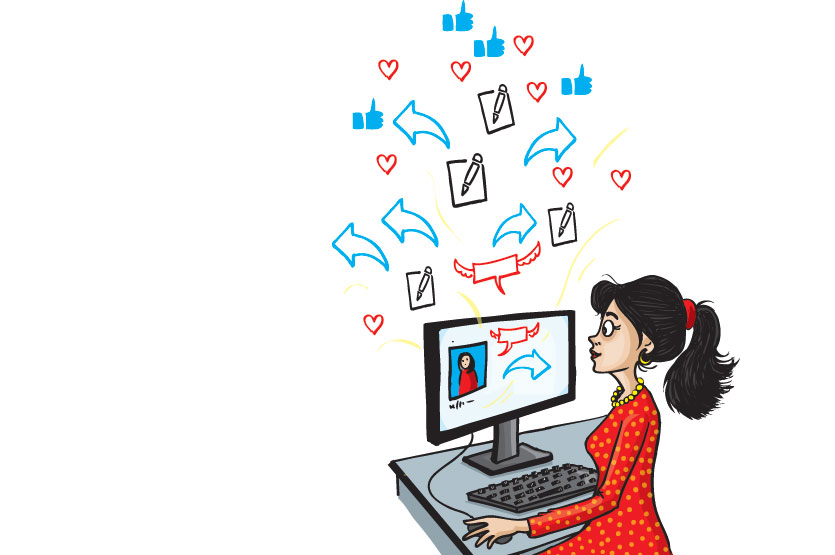Jun 22 2017.
views 1289
To love someone is to place your trust on him or her. At no point would you imagine your naked body to be shared with the rest of the world on Facebook. Hence, with time, partners have become revenge-seekers to 'teach lessons' to their once beloved better halves. This phenomenon was quite evident when sex tapes went viral on social media quite recently. Adding more coal to fire were photos of suicide and otherwise sensitive and explicit content which filled newsfeeds. While some became poets and made onlookers realise the gravity of falling in love with the wrong person, certain others 'had fun' at the expense of the deceased.
Revenge porn is the sexually explicit portrayal of one or more people that is distributed without their consent via any medium. The possession of the material may be used by the perpetrators to blackmail the subjects into performing other sex acts, to coerce them into continuing the relationship, or to punish them for ending the relationship. In the wake of civil lawsuits and the increasing numbers of reported incidents, legislation has been passed in a number of countries and jurisdictions to outlaw the practice, though approaches have varied. The practice has also been described as a form of psychological abuse and domestic violence, as well as a form of sexual abuse.
In an attempt to shed light on this topic, Life Online takes a look at several revenge porn laws which have been executed in some Asian countries and also in the West. We also spoke to several individuals to find out the existing laws in Sri Lanka which address cybercrime and what happens as a result of sharing such content and playing with another's privacy.

The media should stop glorifying explicit content and sensitive incidents: Dr. Ramani Ratnaweera
Speaking to Life Online, Dr. Ramani Ratnaweera, Consultant Psychiatrist at the Karapitiya Teaching Hospital said that posting intimate photos on social media would be quite humiliating and distressing at the same time. "When people record sexual encounters, they usually don't think of the consequences. This has quite a huge impact on married life, if these photos are being shared elsewhere. Due to technology and social media, there will be marital disharmony and adults may argue in front of children. As a result children will also get to know about their parents' issues. When engaging in sexual relationships, the couple should have their own privacy. When photos and other materials are shared, it damages their reputation, especially that of the girl. Therefore children will feel insecure, confused and discontent and in turn his or her personality will not develop. Such incidents would lead to a divorce and a disturbed family life. It's quite alarming to see that many people seek revenge by interfering with another person's privacy. Life could be changed forever due to such traumatic experiences. But what I would like to say is that social media should be used more intelligently rather than to destroy another person's life."
When asked about the sharing of other explicit content such as photos of suicide and murder, Dr. Ramani further said that cases of suicide could be related to the Copycat Syndrome.
"When one person does it in a particular way, there's a tendency for others to follow. Therefore the media has a huge role to play in reporting such incidents in a responsible manner. When the mass media put suicide in the spotlight, it would have an effect on other vulnerable people as well. During the recent turn out of events, well-educated, pretty girls were victims of suicide and this is attracts the majority of the population. Glorifying the method of death, location and other details will encourage the vulnerable group to attempt suicide in a similar way. This was evident in the sudden turnout of suicides which happened on the railway tracks."
In her concluding remarks, Dr. Ramani said that there has to be a way in which these individuals could be given some kind of support. "There are many support groups out there who would give a hand for these victims to win back their life but unfortunately, such groups are not given much publicity. It's high time to implement some strict laws in order to prevent these things from repeating again."
No laws to protect a person from being defamed on social media: CCD
Life Online also contacted the Cyber Crime Division (CCD) which is under the purview of the Criminal Investigation Department (CID) to find out the laws governing cybercrime. Here we learned that there are no laws to protect a person from being defamed on social media. A source who remained under strict condition of anonymity affirmed that the entire clause which addresses the defamation of an individual was removed following an amendment in 2002.
"Therefore we cannot take action under any criminal procedure. However a civil action could be taken if the defamed individual files a complaint and a sexual abuse has been done via online media. There are direct charges for hacking, robbing data and other cybercrimes. If a sexual abuse has been done via social media or any other online platform, a person could be imprisoned for five years or more under the section 345 of the Penal Code Ordinance."
International revenge porn laws
Revenge porn is a growing problem in many parts of the world. Many countries, such as the UK, have recently enacted national laws specifically criminalising revenge porn and punishing perpetrators with jail time or large fines.
In England and Wales, revenge porn became illegal in April 2015 and carries a maximum jail time of two years. Northern Ireland and Scotland enacted similar laws in 2016. Some people have criticised the British law because it requires victims to prove evidence of malicious intent, thus eliminating prosecution for people who simply share the images without knowing who they are about.
Some countries which enacted revenge porn laws are as follows:
Japan - Japan enacted laws against revenge porn in November 2014. These include a maximum sentence of 500,000 yen or three years in jail. The first successful prosecution in February 2015 was against a man who scattered physical pictures of his nude girlfriend in a mall parking lot.
Germany - Germany has very strict laws on privacy which have been successfully applied to revenge porn. In May 2014, courts ruled in favour of a revenge porn victim, requiring her ex-partner to delete all intimate photos of her. Later cases have given women the right to "revoke consent" and require a partner to delete intimate images at any time, even if they're only held privately.
France - France also already has privacy protections in place which can be applied to revenge porn. French penal code forbids the transmission of pictures 'taken within a private place without the consent of the person concerned.'
Canada - Bill C-13, popularly called the Cyber-bullying Act, came into effect in April 2015. As well as protecting children from online harassment and bullying, the law can be applied to adult victims of revenge porn. The first big victory came in January 2016 when courts awarded more than $100,000 in damages to a woman whose ex had posted a private sex tape of her.
Australia - Like the US, there is no national law in Australia, however two states, Victoria and South Australia, have already criminalised revenge porn, and New South Wales is in the process of proposing legislation. Maximum penalties include two years in jail in Victoria and either a $10,000 fine or two years in jail in South Australia.
The Philippines - In 2009, the Philippines was one of the first countries to nationally criminalise revenge porn. Perpetrators will serve a minimum of three years in jail time.
Israel - Israel updated the Sexual Harassment Bill in 2014 to include sharing intimate photos without the subject's consent. Revenge porn is considered a sex crime in Israel and penalties are some of the strictest with up to five years in jail.
Source: ReputationDefender
For any cases of cybercrime contact the Cyber Crime Complaint center via (011) 2 421 111.
0 Comments